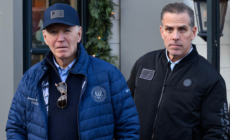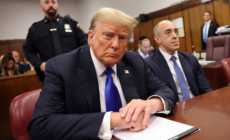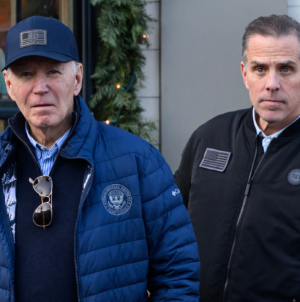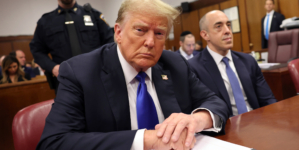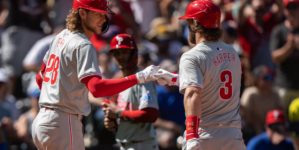-
Half of US Adults Disapprove of Joe Biden Pardoning Hunter: Poll - 15 mins ago
-
Eric Adams Suggests the Biden Pardon Proves He Was Also Targeted - 35 mins ago
-
Donald Trump Pardon Supported by Top Democrat - 50 mins ago
-
How Bangladesh’s Economy Was Siphoned Dry - about 1 hour ago
-
Mariners Linked To Trade For Phillies’ Projected $142 Million Alec Bohm - about 1 hour ago
-
‘Wordle’ Today #1,264 Clues, Hints and Answer for Wednesday, December 4 - 2 hours ago
-
For Some Koreans, Martial Law Stirs Harrowing Memories of Gwangju Uprising - 2 hours ago
-
NYT ‘Connections’ December 4: Hints and Answers for Game #542 - 3 hours ago
-
California Democrat Flips Seat in the Last House Race to Be Decided - 3 hours ago
-
Pete Hegseth ‘Biggest Casualty’ in Trump, DOJ Agreement: Legal Analyst - 3 hours ago
Why L.A.’s progressive ‘godfather’ is struggling to remain D.A.
It’s a Saturday morning in late September, and Los Angeles County Dist. Atty. George Gascón’s voice is hoarse as he struggles to film a TikTok video.
A staffer rushes to grab a water bottle as Gascón alternates between explaining his position on the death penalty and repeatedly trying to sync his voice and awkwardly gesticulate along with a viral audio snippet as one of his campaign’s teenage interns captures it all on her cellphone camera.
“This is one of the most difficult parts. If my kids ever see this they will laugh,” he says during a break in filming before he speaks at SEIU Local 2015’s headquarters in Rampart Village.

L.A. County Dist. Atty. George Gascón is filmed by Aleena Marquez, an intern making a TikTok video for his campaign, in September.
(Genaro Molina / Los Angeles Times)
Public speaking, whether for social media or to a room full of supporters, isn’t Gascón’s strong suit. The “godfather of progressive prosecutors” has been in the public eye for more than a decade through three terms as district attorney in San Francisco and L.A., but he’s always maintained a nervous, at times combative presence in front of crowds — swallowing words, glowering over pointed questions and laughing at his own jokes before the punchlines.
In 2020, Gascón’s idiosyncratic public presence mattered little compared with his vision for the district attorney’s office. Preaching criminal justice reform and police accountability in the months following the killings of George Floyd and Breonna Taylor, Gascón received millions in contributions from liberal megadonors and endorsements from heavyweight Democrats such as Vice President Kamala Harris, Sens. Bernie Sanders and Elizabeth Warren and Gov. Gavin Newsom.
Four years later, that support has evaporated.
Gascón is trailing his challenger, former federal prosecutor Nathan Hochman, by as many as 30 points in recent polls. The big name politicians who once backed Gascón are gone and most of his donors have vanished, with Hochman out-fundraising and outspending the incumbent 11 to 1.

L.A. County district attorney candidate Nathan Hochman speaks alongside actor Esme Bianco during an Oct. 9 news conference to criticize incumbent George Gascón for his handling of cases involving gender-based violence.
(Michael Blackshire / Los Angeles Times)
Gascón won office at a time when the public was crying out for criminal justice reform. He now faces an electorate concerned about public safety even with crime trending down by some metrics.
Hochman has unleashed a media blitz blaming Gascón for high-profile crimes, but the county race reflects a broader shift among voters across the state. Progressive prosecutors in the Bay Area have struggled in recent years with Chesa Boudin being recalled in San Francisco in 2022 and a recall vote looming for Alameda County’s Pamela Price. The Proposition 36 ballot initiative — which Gascón opposes because it would lengthen prison sentences for many crimes — appears all but certain to pass.
Gascón has tried to maintain a positive spin, noting that he came from behind to defeat then-Dist. Atty. Jackie Lacey in 2020, but by his own admission he’s frustrated and disheartened by how often people blame him for multifaceted problems such as street crime or homelessness.
He’s been at war with his own line prosecutors for nearly his entire term, and these days he keeps tight counsel with just a few trusted advisors. Even some of them, speaking on condition of anonymity, say the race is lost.
All Gascón can do now is search for something, anything, to shift the tides.
Today, that means he is dancing in a suit and mouthing the lyrics “I pay attention to things that most people ignore,” a line from a song by pop star Olivia Rodrigo.
“This is why you have my support,” one commenter wrote when the video was later posted to Instagram with Gascón gesturing wildly at overlain text highlighting some of his campaign’s priorities.
“Desperate much?” another responded.
Gascón’s first run for office in Los Angeles was all about leaning into voters’ hunger to shake up the criminal justice system.
On his first day as district attorney, Gascón barred prosecutors from seeking the death penalty, trying juveniles as adults, or filing charges for several low-level misdemeanors. Pushing the idea of “restorative justice,” he vowed to expand efforts to review wrongful convictions and prosecute police misconduct.
Although painted by some as “radical” and “extreme,” the moves came at a political moment when much of the public was laser-focused on criminal justice reform. Gascón’s approach followed years of attempts by state legislators to reduce California’s overburdened prison population.

Dist. Atty. George Gascón, center, takes a selfie with members of SEIU Local 2015 during a reelection rally at the headquarters of the union for service employees in Los Angeles on Sept. 28.
(Genaro Molina / Los Angeles Times)
But the all-or-nothing nature of Gascón’s Day 1 edicts made it easy for critics to point to several cases in which people freed or given a lighter sentence under his policies went on to be arrested for violent crimes.
The nuances of cases were often lost in the political wash. Gascón’s policies were blamed for the murder of two El Monte police officers in 2022, even though subsequent investigations by The Times and the L.A. County Office of Inspector General showed the probation department failed to arrest or properly supervise the shooter in the weeks before the killings.
Gascón has also been attacked for declining to prosecute juveniles as adults, even though state law makes it unlikely they could have been tried in adult court anyway.
He has tried, repeatedly, to inject context and data into those debates. But his measured, bookish approach is often drowned out by the anguish and fury of crime victims.
Gascón has consulted experts about how to get his message across, he said in a recent interview, but nothing seems to break through.
“If I had one thousand bucks for every time I got advice on how to communicate better, I would be a wealthy man today,” he said.
Cristine Soto DeBerry, Gascón’s former chief of staff in San Francisco, said his academic manner of speaking is born out of his reluctance to simplify the complexities of the justice system to score points with voters.
“He refuses to be the kind of politician that has a polished stump speech everywhere they go,” she said. “I think sometimes that damages him in a world that wants to have the shiny, glossy version of an elected leader.”
That puts Gascón in stark contrast to Hochman, a polished public speaker who often keeps his comments narrowly tailored to promises to improve public safety.
Hochman compared L.A. to “Gotham City” when he announced his campaign last year, casting himself in the role of resolute crime fighter. His simple but effective messaging forecasts a return to normalcy, a promise of safety and restored order in a D.A.’s office many consider to be in discord.

Dist. Atty. George Gascón and challenger Nathan Hochman speak at a debate Oct. 8.
(Jason Armond / Los Angeles Times)
But Hochman has also run a campaign light on specifics. His positions largely boil down to reversals of Gascón’s edicts and a promise to operate in “the hard middle.” When pressed for policy particulars, Hochman often says he’ll “empower” prosecutors to make case-by-case decisions.
Some critics contend that might be preferable to Gascón’s blitzkrieg approach. Ryan Ehrlich, vice president of the union representing rank-and-file prosecutors, said Gascón might have had more success if he had won their buy-in before he enacted his policies.
“The approach was really the original sin of Gascón and the beginning and the end of this administration,” Ehrlich said. “I think it was an example of a larger problem that plagued him throughout his administration, which was poor management of people in the office.”
Gascón’s tensions with his staff led to a no-confidence vote, accusations of retaliatory practices and a flood of lawsuits.
That chaos has affected voters, according to a recent L.A. Times poll, with 90% of Hochman supporters citing a need to “reduce turmoil” in the office as a reason they intend to vote for him. Gascón’s turn as district attorney is a cautionary tale, according to Dan Schnur, a former advisor to Republican politicians who now teaches political communications at USC.
“This is a lesson that the most progressive Democrats and the most conservative Republicans are slow to learn,” he said. “Most voters prefer change to happen gradually.”
Gascón likes to tout his long record of public service. He joined the U.S. Army in the 1970s, then rose through the LAPD’s ranks, becoming an assistant chief. He took a job as police chief in Mesa, Ariz., in 2006 and was appointed district attorney of San Francisco in 2011.
With both violent and property crime rising from 2019 to 2023 countywide, he has spent his reelection bid trying to prove he can maintain his progressive ideals while easing anxieties that he won’t hold criminals accountable.
Sporting a dark suit and sunglasses in the bright afternoon sun in a Watts parking lot during a campaign stop last month, Gascón is quick to point out he “did two tours” as an officer in the neighborhood as he schmoozes with local advocates.
The appearance was the latest in an ongoing effort to prove he’s as committed to prosecuting violent criminals as he is to reform. Gascón often points to a Times analysis showing he files charges against felons nearly as often as his predecessor. He has walked back many of his initial dictates. Juveniles can now be prosecuted as adults, and some sentencing enhancements can be sought.

Dist. Atty. George Gascón speaks during a press conference Aug. 19.
(Al Seib / For The Times)
“We prosecute aggressively … our office is leading the state in the number of hate crime prosecutions,” Gascón says in Watts, pitching himself as tough on crime.
But moments later, he tries to thread the needle and reassure anyone who may have been put off by the gung-ho rhetoric: “We also created a restorative justice model.”
Recently, he’s dipped his toes into the case of brothers Erik and Lyle Menendez, stating earlier this month that he is considering new evidence that the brothers were molested, which could open a path to a new trial or a reduction in their sentences. The announcement has drawn criticism from Hochman and others who question its timing barely a month before election day.
More than 90% of L.A. County voters say they’re concerned about crime, yet Gascón parries most questions about crime increases with supplemental data. Violent crime may be up countywide over the length of his term, he notes, but down in the city this year, according to LAPD statistics. Increases in violence have been worse in neighboring counties with more conservative district attorneys, he often says.
Gascón’s data-driven pushbacks have done little to chip at public perceptions of crime run amok. Still, he maintains that voters don’t have to choose between reform and safety.
“I don’t think people want to go back to mass incarceration,” he said. “We have been very aggressive in our prosecutions of very serious and violent crimes from the very beginning. You don’t separate one from the other.”
Enthusiasm for those efforts isn’t reflected in Gascón’s endorsements or his campaign war chest. While he’s received the backing of L.A. County’s Democratic Party and the Federation of Labor, big-name endorsers like Harris, Sanders, Warren and Newsom — who appointed Gascón as San Francisco district attorney 13 years ago — have all disappeared. Representatives for each did not respond to calls for comment.
“I think people like Harris, she’s got her own race to run and one of the things [former President] Trump and the Republicans are beating her up on is that she’s soft on crime. She’s got her own issues to deal with,” Gascón said, adding that he “wouldn’t even know how to reach out to” the vice president for an endorsement.
He says his campaign is “grassroots” by design, aimed at winning over local Democratic organizations and undecideds through small town halls and phone banking with voters wary of Hochman’s political past.
Gascón has repeatedly tried to link Hochman to Trump, pointing out that the former prosecutor ran for state attorney general as a Republican in 2022. During a debate earlier this month, Gascón mocked Hochman’s vague policy positions as a “concept of a plan,” but his invocation of the well-known Trumpism drew crickets from the crowd.
There are reasons to question whether Hochman’s politics have changed much since his loss to Rob Bonta in the 2022 race. One of his largest donors, Gerard Marcil, has pumped millions into GOP causes, and during the primary, Hochman hired fundraisers that raised money for Trump in 2020. His descriptions of crime in L.A. often border on the dystopian and echo conservative pundits who use the city as a punching bag.
Hochman says he’s never voted for Trump, and in August he endorsed Harris. A recent UC Berkeley poll co-sponsored by The Times suggests attacks by Gascón — a former Republican himself — on Hochman’s political past are wasted arrows, as only 45% of Gascón’s supporters listed party affiliation as a reason to support him.

Nathan Hochman, center, shakes hands with Rick Caruso, who endorsed him for district attorney during a news conference in Sherman Oaks in June.
(Myung J. Chun / Los Angeles Times)
“During the primary, it appeared that Hochman might end up being the easiest general election candidate for Gascón, but since winning in the spring, he’s done a very effective job of positioning himself much closer to the political center,” Schnur said.
Emotion creeps into Gascón’s voice when he talks about what might happen if he loses.
Pointing to the raft of endorsements and money Hochman has received from police unions, Gascón worries that Hochman would shy away from prosecuting law enforcement officers. Before Gascón’s election, just one cop had been charged for an on-duty shooting in the prior two decades. Gascón has brought at least five such cases, records show.
“On police accountability, it would be a rollback to the days before I came into office, which is a problem because that’s precisely where so much of the friction between the community and law enforcement has come,” Gascón said.
Gascón acknowledged during a campaign planning session late last month that he was aware he and his staff were “inside the echo chamber” and most people aren’t closely following his policy maneuvers or the D.A.’s race.
In 2020, Gascón’s campaign raked in $12 million, much of it from super PACs and outside donors not bound by campaign spending limits who favor criminal justice reform. His largest donors included George Soros and philanthropist Patty Quillin, the wife of Netflix Chief Executive Reed Hastings. As of late September, Gascón’s reelection fund stood at just over $1 million. His past megadonors either gave considerably less or nothing at all, records show.
A Soros spokesman recently told The Times the philanthropist is focused on the presidential contest but still supports Gascón’s policies. Calls and e-mails to representatives for Quillin, Hastings and other top donors to Gascón’s 2020 campaign were not returned.
“The environment in 2020 got people more emotional about putting money in the criminal justice system, and we didn’t see that years before and I don’t think we’re going to see it again,” Gascón said. “But I don’t think that necessarily translates into disapproval of the work that we’re doing.”
Times staff writer Gabrielle LaMarr LeMee contributed to this report.
Source link


